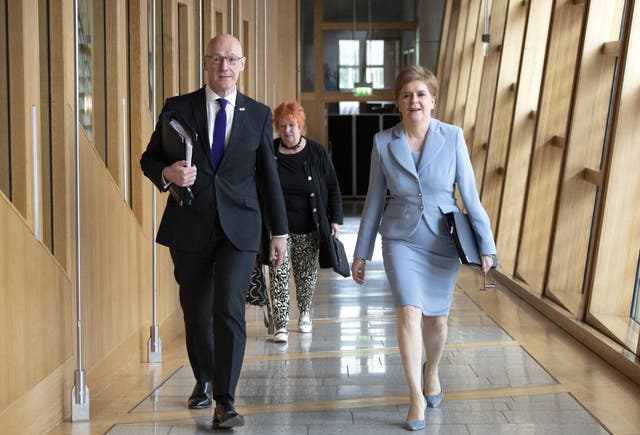Nicola Sturgeon has told the Prime Minister that Holyrood was “ready and willing” to negotiate steps towards holding a second referendum but warned any block would not mean Scots are “refused the democratic right to choose”.
The First Minister and Boris Johnson spoke in a brief telephone conversation on Monday in which they discussed “a range of topics”, a Scottish Government spokesman said.
On Ms Sturgeon’s push for a second independence referendum next year, she told the Prime Minister that Holyrood was “ready and willing to negotiate” steps towards holding another vote, but said if blocked it would not mean voters north of the border are “refused the democratic right to choose”.

However, Mr Johnson told MPs earlier there was a vote in 2014 and added: “I think right now the priorities of the country should be rebuilding after Covid.
“They should be taking us forward together as a united country, and that’s what we want to do.”
Last month Ms Sturgeon outlined plans to hold the vote on Scotland’s place in the union on October 19 2023.

With the UK Government refusing to grant consent for such a ballot to be held, Ms Sturgeon is asking Supreme Court judges to rule if Holyrood can hold a referendum without the backing of Westminster.
If the bid fails, Ms Sturgeon told MSPs, the SNP will fight the next general election as a “de facto referendum” on the single issue of whether Scotland should be an independent country.
A Scottish Government spokesman said: “In discussing Scotland’s future the First Minister again made clear that the Scottish Government is ready and willing to negotiate a Section 30 order to secure a referendum on independence but reiterated that the absence of a Section 30 order will not mean Scotland is refused the democratic right to choose.”
I've just spoken to @NicolaSturgeon to herald the success of UK collaboration supporting Ukraine.
I thanked the @ScotGov’s £65 million contribution in upping UK’s military aid to Ukraine to £2.3 billion & efforts to help house 6,000 Ukrainian refugees.
Thank you, Scotland.
— Boris Johnson (@BorisJohnson) July 4, 2022
A Section 30 order refers to the part of law which allows Holyrood to pass laws which would otherwise only be reserved to Westminster, such as constitutional questions.
The first independence referendum was passed through a Section 30 order as part of the Edinburgh Agreement.
On the call between the leaders in Westminster and Edinburgh, the spokesman added: “There was a shared recognition of the efforts of both the Scottish and UK Governments in supporting the people of Ukraine including recent financial support for military assistance and the work that has gone into helping citizens choosing to temporarily make their home in Scotland.
“The two leaders agreed that a heads of government meeting will take place in the near future to discuss the current cost-of-living crisis.
“Both governments will work together to develop proposals ahead of that meeting to help those most in need of support.”
After their discussion, Mr Johnson said he had spoken to Ms Sturgeon to “herald the success of UK collaboration supporting Ukraine”.
“I thanked the Scottish Government’s £65 million contribution in upping UK’s military aid to Ukraine to £2.3 billion & efforts to help house 6,000 Ukrainian refugees,” he wrote.
“Thank you, Scotland.”




Comments: Our rules
We want our comments to be a lively and valuable part of our community - a place where readers can debate and engage with the most important local issues. The ability to comment on our stories is a privilege, not a right, however, and that privilege may be withdrawn if it is abused or misused.
Please report any comments that break our rules.
Read the rules here